by nchicoine | Feb 23, 2022 | Daniel, Readings
One of the more vivid scenes in Daniel occurs when Nebuchednezzer prepares to throw the three young men into the flame. Though the actual burning turns out to be anticlimactic, the paragraph of preparation is rife with anticipation and evil depictions of the flames....

by lbirkholz | Feb 22, 2022 | Daniel, Genesis, Life of St. Margaret, Readings, Theories
One of the greatest differences between the depiction of humanity’s fall in the Vulgate Bible and the Old English poem Genesis B is the nature of Eve’s temptation by the snake. While in the Vulgate the snake tells Eve that upon eating the apple her “eyes shall...
by jozeng | Feb 17, 2022 | Daniel, Life of St. Margaret, Theories
Group: Jonah, Spencer, Frances, and Jo The phenomenon of looking can be thought of as consisting of two composite parts: seeing and interpreting. Seeing, the visual experience of something happening before one’s own eyes, or gazing upon a representation such as a...

by mraygor | Feb 15, 2022 | Daniel, Genesis, Life of St. Margaret, Questions, Readings
When the three youths are saved from the flames in the Old English verse-form of the Book of Daniel, Nebuchadnezzar can hardly believe his eyes. At the sight of this miracle, Nebuchadnezzar declares, “Now I truly see four people there – I do not deceive myself at all”...

by Merrin | Feb 14, 2022 | Daniel
In The Poetics and Politics of Witnessing, Derrida argues that trust in a witness’ account is derived from the belief of those listening. Derrida explains, “Bearing witness appeals to the act of faith, and thus takes place in the space of pledged or sworn word”...

by spencerscott | Feb 5, 2022 | Daniel, Readings
The human life is a mediated experience: we do not encounter an unfiltered world, but rather we process every input through our senses. Among our five senses, sight often reigns supreme; this article is not one of Professor Saltzmann’s podcasts, and I assume you...




